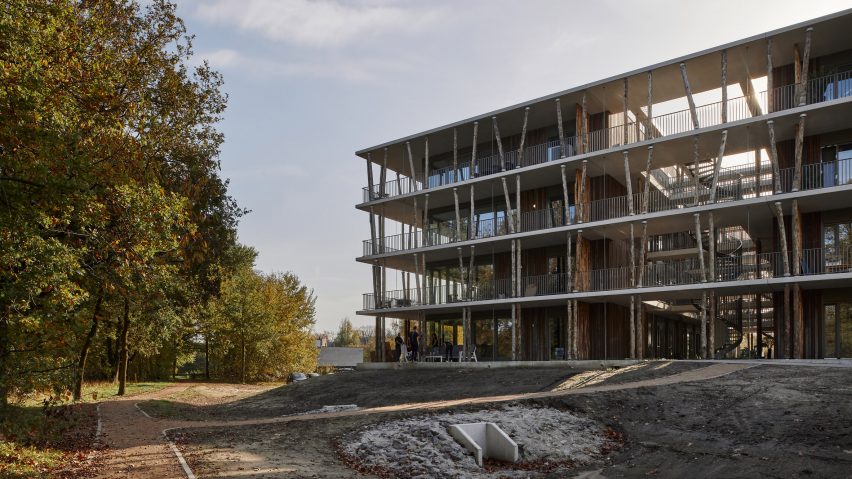Dutch architecture studio GAAGA has created a residential building in the forested Bosrijk park in Eindhoven, the Netherlands, which is wrapped by colonnades of tree trunks.
Named Forest Bath, the building is informed by the Japanese practice of shinrin-yokuku, or forest bathing, which is a therapeutic act centred on spending time in nature.
"The design is inspired by the Japanese practice shinrin-yoku, in which you immerse yourself in the forest, taking in nature using all your senses to calm your body and mind," said GAAGA.
"With a balanced design, subdued aesthetics, use of natural materials, people- and environment-friendly sustainability principles and above all, a strong connection between the resident, building and the forested landscape, we turn the project into a modern residential building in harmony with its natural surroundings."
To help the Forest Bath housing blend in with its surroundings, its facade is wrapped in colonnades of tree trunks that are used in place of columns.
Teamed with tactile reclaimed-wood cladding, this is also intended to allow nature to be "experienced up close" by residents, the studio said.
"From the outside, you see no real distinction between the different sides of the building thanks to the continuous balconies supported by a colonnade of tree trunk columns," said GAAGA.
"As the image of the tree trunk columns gets intertwined with the image of the trees in the park, the building blends in with its surroundings."
Forest Bath has a rectangular plan and is embedded in a gently sloping site that sits in a clearing amongst the trees. It is four storeys tall and also has a basement level.
Inside, it contains three different apartment types ranging from 80 to 143 square metres, while the basement contains facilities including car- and bicycle parking.
At the heart of the building is an open, planted courtyard, into which all of the apartments open and are linked by a spiral staircase, balconies and walkways.
To help further the building's feeling of being connected to the park, a path runs from the surrounding trees and into this sheltered outdoor space.
This green passage is planted with a range of ferns and other shadow-dwelling plant species, such as climbing plants that will be encouraged to wind up around the structure.
Here, there are also angular stools, nesting boxes for birds and bats, and rainwater chains. These chains direct water to a small brook running through the passage and out to the landscape, where the studio said there is a wadi – a type of stream that is dry until it rains.
"Walking routes from the park connect to this green passage, with the ground being covered in ferns and rainwater flowing into a brook towards the wadi," said the studio.
"The light is filtered by flowering and fragrant climbing plants shooting into the air and by the many bridges leading to the apartments' front doors."
GAAGA's goal for the building's structure was for it to embody principles of the circular economy.
According to the studio, "at least 85 per cent of the weight of the applied materials is circular, meaning it is either recyclable or suitable for direct reuse".
This means the structure is also demountable at the end of its life, including its cladding and the concrete elements of its superstructure.
"The main concrete supporting structure, responsible for the vast majority of the total weight, is made of prefabricated components with demountable connections," GAAGA explained.
"This way of building makes it possible for separate concrete elements to be repositioned or reused in the future so that their individual lifespan can be extended."
Completing the design is a landscape strategy developed with landscape architect MAAK Space, which will eventually see the planting of pine, oak, birch, sweet cherry and willow tree species.
The studio said the design also supports the mix of habitats in the forest clearing, ensuring it is "inviting" to butterflies, bees, birds, dragonflies and amphibians.
GAAGA is not the only architecture studio to have recently used tree trunks in place of columns. In Helsinki, Jaakko Torvinen incorporated 95 pine trees into the Little Finlandia events centre.
Other projects by GAAGA, a Leiden-based studio founded in 2007, include the Stripe House, which is covered in horizontal grooves, and a pair of homes that are cleverly disguised as one.
The photography is by Max Hart Nibbrig.
Project credits:
Architect: GAAGA
Landscape architect: MAAK Space
Consulting engineer sustainable building: NIBE
Structural engineer: Van Rossum Raadgevende Ingenieurs
Construction: Dura Vermeer

